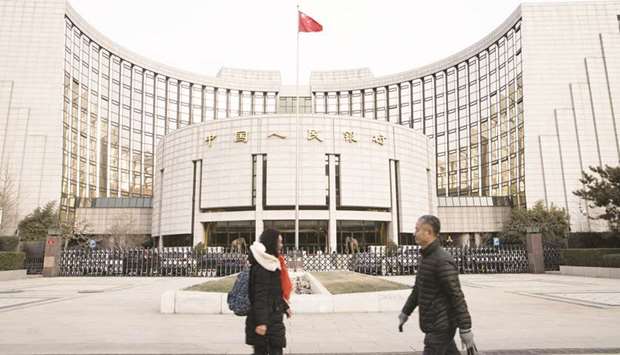China’s central bank said it will temporarily purchase loans made to small businesses from some local banks, a new policy to boost the supply of lending to the real economy.
The plan will use 400bn yuan ($56bn) from a separate programme to buy 40% of unsecured loans to small and medium-sized firms with maturities of at least six months made between March 1 and December 31, 2020, the People’s Bank of China said Monday.
Commercial lenders should repay the central bank the funds a year after the transaction.
The lenders will continue to receive interest payments from the borrower and will bear any losses if the loans go sour, the PBoC said.
The central bank will sign contracts with qualified local commercial lenders via a special-purpose vehicle, and the plan could boost banks’ unsecured loans to small firms by 1tn yuan, it said.
By taking loans to small businesses on to its balance sheet, the PBoC may help lower lenders’ capital requirements and thereby lower the cost of further lending.
While the authorities have cut policy rates multiple times this year, they’ve avoided the large-scale stimulus seen in other major economies to avoid aggravating the country’s debt problem.
“The policy intention is to solve the funding problem for small and micro-sized companies, which play a vital role in job stability,” Qu Qing, chief economist at Jianghai Securities Co in Beijing, wrote in a note.
The policy would have “limited effects” on supplying liquidity to banks and lowering borrowing costs, meaning it can’t replace outright interest rates cuts, he said.
The credit support plan will use funding from the PBoC’s relending programme which it has relied on to provide cheap base money to the financial system since the Covid-19 crisis.
Unlike the regular re-lending funding which is offered at 2.5% a year, the PBoC said qualified commercial banks will only need to return the principal of the funding, indicating it’s interest-free.
Qualified banks are local lenders rated between 1-5 level in the PBoC’s recent quarterly financial institution rating. Companies receiving credit from the un-collateralised loans supporting programme have to promise they’ll keep jobs stable The plan is an innovative version of an interest-free reverse repurchase operation, in which local banks still bear the credit risk, and that makes it different from quantitative easing, according to Zhang Lu, an analyst at CEBM Group Ltd in Beijing. “The room for the central bank to further cut interest rates is limited as long as the economy doesn’t worsen from here,” Zhang wrote in a note, adding the PBoC will instead focus on ensuring sufficient liquidity and direct the credit to needy sectors. Some see the plan as having the potential to develop into a form of Chinese QE in the end.
“We think the programme will have to be rolled over or scaled up amid the economic downturn,” said Xing Zhaopeng, a markets economist at Australia and New Zealand Banking Group Ltd in Shanghai. “In fact, this will start the QE process of lending cheap funds directly to the real economy.”
The central bank also announced Monday that small companies would be allowed to delay loan repayments to March 2021. Combined, the two new policies would make monetary policy more “direct” in increasing loans to the real economy and help stabilise funding flows to small firms and improve their access to credit.
The PBoC will sign interest rate swap contracts with commercial lenders via a special-purpose vehicle, and give relending funds as incentives to them for 1% of the loan principals being delayed.
The total relending funds being offered is 40bn yuan.

Pedestrians walk past the People’s Bank of China headquarters in Beijing. The central bank will sign contracts with qualified local commercial lenders via a special-purpose vehicle, and the plan could boost banks’ unsecured loans to small firms by 1tn yuan, it said yesterday.
